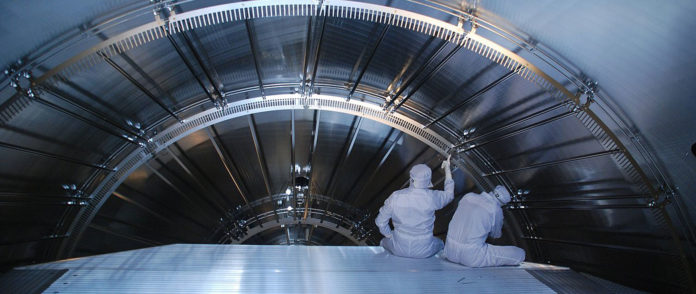Since the discovery of neutrino oscillations, it has been well known that neutrinos have non-zero mass. However, the absolute neutrino-mass scale remains unknown.
Measurement of the mass scale of neutrinos could offer a better understanding of the universe. This is the challenge the international KATRIN experiment at the Karlsruhe Institute of Technology (KIT) with partners from six countries, including the Technical University of Munich (TUM), has taken up as the world’s most sensitive scale for neutrinos.
The team used the beta decay of tritium to determine the neutrino’s mass via the energy distribution of electrons released in the decay process. Using a giant spectrometer, they measured the energy of decay electrons with unprecedented precision. Their experiment has broken a significant “barrier” in neutrino physics.
Scientists reported that an upper limit of 0.8 eV can be derived for the mass of the neutrino, a precision that has not been achieved anywhere in the world before.
Guido Drexlin (KIT), the project leader and one of the two co-spokespersons of the experiment. Christian Weinheimer (University of Münster), the other co-spokesperson, said, “KATRIN is an experiment with the highest technological requirements and is now running like perfect clockwork. The increase of the signal rate and the reduction of background rate was decisive for the new result.”
“Only by this laborious and intricate method, we were able to exclude a systematic bias of our result due to distorting processes. We are particularly proud of our analysis team, which successfully took up this huge challenge with great commitment.”
Scientists noted, “This is the first time that a direct neutrino mass experiment has entered the cosmologically and particle-physically important sub-eV mass range, where the fundamental mass scale of neutrinos is suspected to be.”
Neutrino expert John Wilkerson said, “The particle physics community is excited that the 1-eV-barrier has been broken by KATRIN.”
Susanne Mertens, professor of dark matter at TUM, explains the path to the new record: “Our team at the MPP in Munich has developed a new analysis method for KATRIN that is specially optimized for the requirements of this high-precision measurement. This strategy has been successfully used for past and current results. My group is highly motivated: We will continue to meet the future challenges of KATRIN analysis with new creative ideas and meticulous accuracy.”
Journal Reference:
- The KATRIN Collaboration. Direct neutrino-mass measurement with sub-electronvolt sensitivity. Nat. Phys. 18, 160–166 (2022). DOI: 10.1038/s41567-021-01463-1
